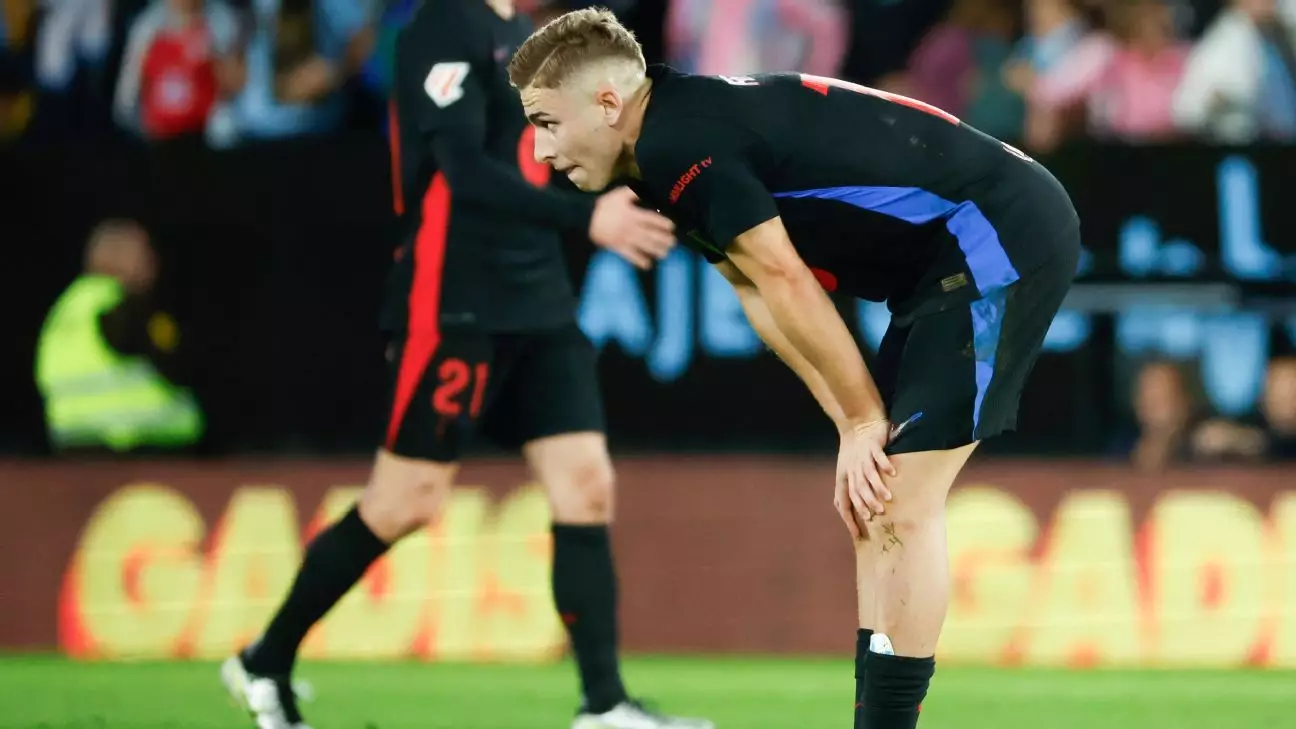In a match that promised to solidify their position at the top of LaLiga, Barcelona’s stunning collapse against Celta Vigo left both fans and players in disbelief. Leading 2-0 thanks to goals from Raphinha and Robert Lewandowski, it seemed as if the Catalonia giants were on the cusp of securing maximum points. However, a tumultuous final six minutes, characterized by a red card for Marc Casadó and a series of defensive blunders, saw Barcelona surrender their lead, ending the game in an unexpected 2-2 draw. This disappointing result extended Barcelona’s winless streak, raising concerns over their form as they prepare for crucial upcoming fixtures.
Barcelona’s head coach, Hansi Flick, did not mince words in his post-match analysis, critiquing the lack of intensity and concentration exhibited by his players. During a post-game press conference, Flick remarked, “Sometimes it happens that you see such a performance from a team. I didn’t expect that we could play really bad like that.” His assertion highlights a critical perspective on the game’s psychology; teams often find themselves caught in a false sense of security when enjoying a lead, which can lead to complacency. Flick’s recognition of this trap is crucial, as the mental aspect of football plays a pivotal role in high-stakes matches.
Despite Barcelona’s early dominance, they were repeatedly matched by a spirited Celta Vigo side that demonstrated resilience and determination. The statistics reflect a concerning trend for Barcelona: they registered six fewer shots on goal than their opponents despite being in a commanding position earlier in the match. Flick’s acknowledgment of this disparity throws light on an essential facet of modern football – the ability to maintain a competitive edge throughout the full 90 minutes.
Flick placed a significant emphasis on concentration and focus, suggesting that some players might have underestimated Celta Vigo as an opponent. He remarked, “Everyone now wants to win against us and wants to play good against us,” asserting that each match in LaLiga demands unwavering focus. Flick’s perspective prompts a re-evaluation of how elite teams approach contests that, on paper, seem manageable. The growing expectation for teams to play well against Barcelona means that complacency can be swiftly punished, as evidenced by Celta’s late resurgence.
The coach pointed out the collective responsibility of the team, moving the onus away from any single player’s mistake, such as Jules Koundé’s crucial blunder late in the game. This indication of unity, despite individual errors, speaks to a broader issue: a cohesive team structure can collapse under pressure when key moments slip through their fingers. With Barcelona set to continue their campaign, this failure serves as a critical sounding alarm for the need for cohesiveness and enhanced focus across all 11 players on the pitch.
Koundé, reflecting on his moment of miscalculation, expressed a desire for accountability, admitting, “There was a lack of concentration on my part.” This sentiment is a powerful reminder that self-reflection plays a vital role in the development of individual players and teams alike. It is essential for players to learn from mistakes and to recognize that failure offers valuable lessons that can shape future performances.
Furthermore, Gavi’s return to the first team following a lengthy injury was overshadowed by the team’s inability to secure a victory. While individual player milestones are significant, the collective goal of winning must remain paramount. Gavi’s awareness of the situation highlights the necessity for the team to translate individual highlights into team successes, emphasizing the importance of mutual support and resilience.
The Road Ahead for Barcelona
Despite this setback, Barcelona remains five points clear at the top of LaLiga, a cushion that can be imperative as they navigate their upcoming fixtures. However, Real Madrid’s proximity, as they have games in hand, should serve as a cautionary tale for Flick’s men. They must quickly rebound and recapture their winning rhythm if they aim to maintain their lead in the league.
The match against Celta Vigo may prove to be just what Barcelona needed to spark the necessary change within the squad. Such confrontations often act as catalysts for improvement, fostering stronger teamwork and dedication to the shared objective of victory. Should Barcelona learn from this experience, becoming more resilient and focused in the face of adversity, they could transform this moment of disappointment into a stepping stone toward greater achievements in the season ahead.

